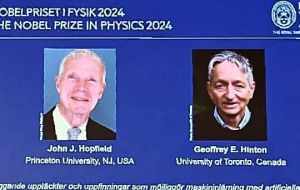MercoPress. South Atlantic News Agency
Nobel Prize in Physics awarded to artificial intelligence pioneers
 The two laureates “used fundamental concepts from statistical physics to design artificial neural networks that function as associative memories and find patterns in large data sets,” it was explained
The two laureates “used fundamental concepts from statistical physics to design artificial neural networks that function as associative memories and find patterns in large data sets,” it was explained Sweden's Royal Academy of Sciences announced Tuesday that it was granting the 2024 Nobel Prize in Physics to John J. Hopfield and Geoffrey E. Hinton for their “discoveries and inventions in artificial intelligence” and “machine learning with artificial neural networks.” The distinction also represented a € 970,000 cheque.
Hopfield created a network which allows the storage of patterns with a method for recreating them. Hence, whenever the network is provided with an incomplete or slightly distorted pattern, the mechanism can find the stored pattern that is most similar.
Jointly, Hopfield (91) and Hinton (76) adapted the former's invention to form a new one called “the Boltzmann machine,” which can be used to classify images or create new examples of the type of pattern it was trained on. Hinton, on the basis of Hopfield's work, helped to initiate the current explosive development of machine learning.
“Although computers cannot think, machines can now mimic functions such as memory and learning,” the Academy stressed. ”This year's Physics laureates have helped make this possible (...) Using fundamental concepts and methods from physics, they have developed technologies that use network structures to process information,“ it elaborated.
”The work of the prizewinners is already of great benefit. In physics, we use artificial neural networks in a variety of fields, for example in the development of new materials with specific properties,“ said Ellen Moons, Chair of the Nobel Committee for Physics. She also pointed out that these discoveries have ”become part of our daily lives, for instance in facial recognition and language translation.” The two laureates “used fundamental concepts from statistical physics to design artificial neural networks that function as associative memories and find patterns in large data sets.” she also explained. “While machine learning has enormous benefits, its rapid development has also raised concerns about our future,” Moons also warned. ”Collectively, humans carry the responsibility for using this new technology in a safe and ethical way for the greatest benefit of humankind.”
Hopfield (91), a US national with a full-time position at Princeton, and Hinton (76) used tools from physics to lay the foundation for today's powerful machine learning. “Machine learning based on artificial neural networks is currently revolutionizing science, technology and everyday life.” Hinton, who has dual Canadian and British citizenship, once quit Google so he could more freely speak about the dangers of the technology he helped create. “Instead of exceeding people in physical strength, it’s going to exceed people in intellectual ability. We have no experience of what it’s like to have things smarter than us. And it’s going to be wonderful in many respects,” Hinton said. “But we also have to worry about a number of possible bad consequences, particularly the threat of these things getting out of control.” He now works at the University of Toronto.
Since the first prize was awarded in 1901, 224 different Nobel Prize winners in physics have been honored, including only five women. One scientist, the US American John Bardeen, has received the prize twice. Last year, the Physics Prize was awarded to Ferenc Krausz, a researcher in Germany, Pierre Agostini in the USA and Anne L'Huillier from France for experiments that gave mankind new tools for researching processes in atoms and molecules.
The winners of the Nobel Prize in Chemistry will be announced Wednesday, Literature on Thursday Peace on Friday, and Economics on Monday, Oct. 14. The awards ceremony traditionally takes place on Dec. 10, marking another anniversary of prize donor Alfred Nobel's passing.




Top Comments
Disclaimer & comment rulesCommenting for this story is now closed.
If you have a Facebook account, become a fan and comment on our Facebook Page!